Gideon John – Displaced By Insurgency. Choked By Flooding. The Story Of 25-Year-Old Nigerian Rice Farmer Who Lost All
Neusroom’s Michael Orodare writes about how Nigeria’s worst flooding in a decade is choking the livelihood of many young Nigerians devising innovative ways out of the country’s economic woes.
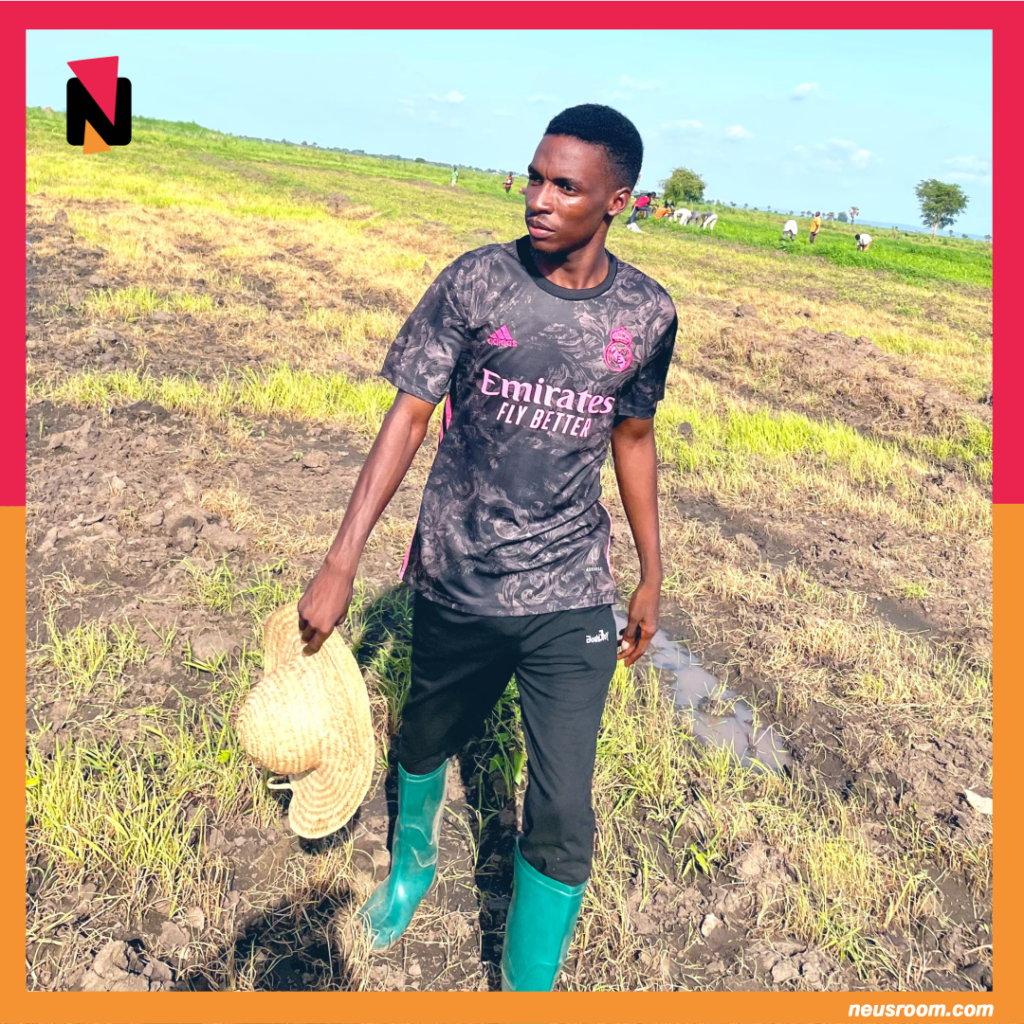
Written by Michael Orodare for Neusroom
October 25, 2022
“I really feel bad and I don’t know where to start from. All hope is lost!” Gideon John, heartbroken and devastated, told me on the phone around 9 pm on Wednesday, October 12, 2022, as he took me on a journey through his story of highs, sharp drops and resilience.
Gideon’s life has been quite a roller coaster ride and right now, the Nigerian farmer is struggling so hard to land back on his feet after Nigeria’s worst flooding in a decade left his seven hectares rice farm in ruins.
On September 24, 2022, Gideon made a Twitter announcement about an incident that shattered his heart and changed his fortune.
“All hope lost! After 2 years of successful farming (rice) on 3 hectares of land after my NYSC, this year I decided to expand to 7 hectares and a lot of money invested. Unfortunately, flood had occurred on us. God na your hand I de,” he tweeted as he shared photos of his seven hectares rice farm submerged by flood.
Surviving a topsy-turvy economy
A self-made entrepreneur, Gideon’s grit and determination landed him at a place he could comfortably say he was young and getting it, but Nigeria’s flooding epidemic is pulling the rug off his feet.
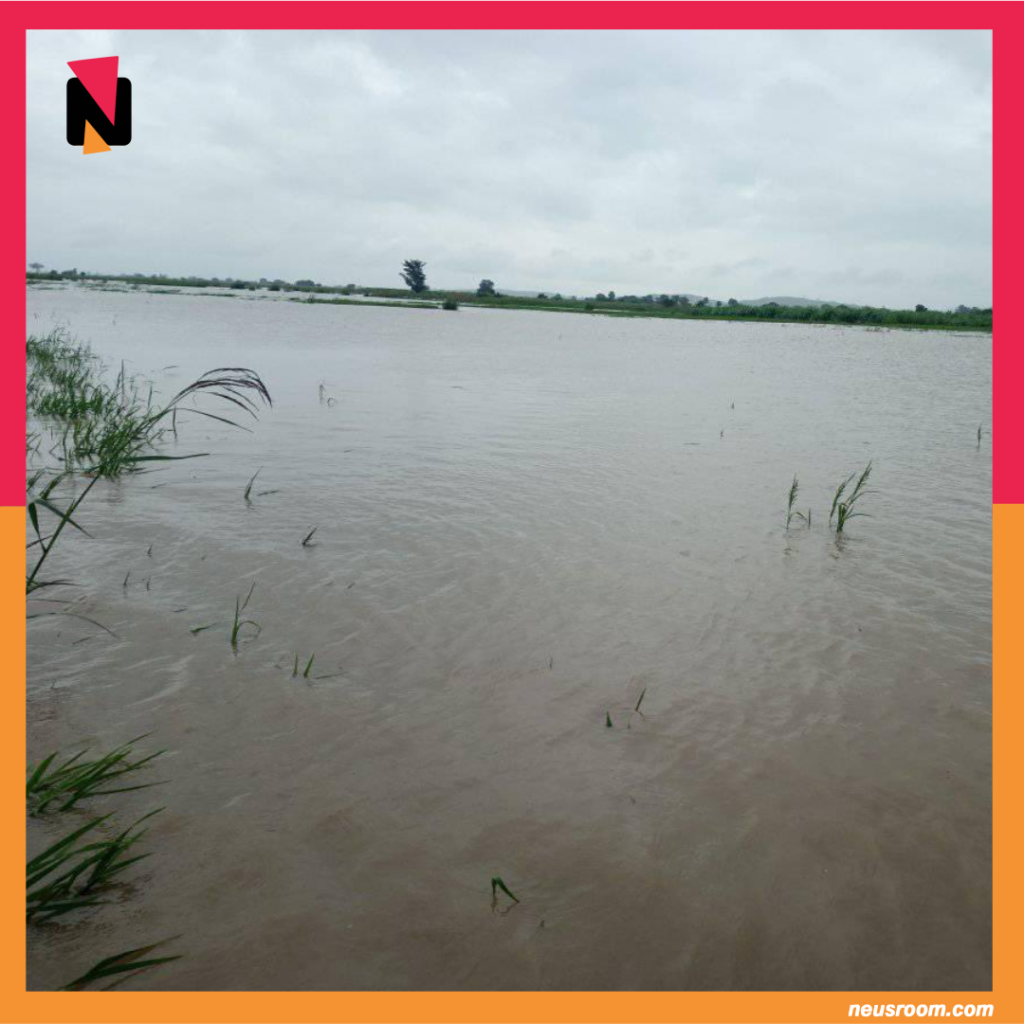
A view of 7 hectares Kayaba Rice Farm submerged by flood. Photo: Gideon John.
Gideon John, 25, a Computer Science graduate, appeared to have chosen his battles wisely when he passed out of the National Youth Service Corps (NYSC) in October 2020, a mandatory one-year volunteering programme for Nigerian higher institution graduates who receive ₦33,000 monthly stipend loosely called ‘allowee’ which means ‘allowance’. Before 2020, the allowance was ₦19,800. After the government increased the national minimum wage to ₦30,000 from ₦18,000, the allowance also went up to ₦33,000, which is about $75.
Passing out of the scheme during the heat of the COVID-19 pandemic, with double digits inflation, a gloomy global economy, rising unemployment, and rising food prices staring at him, Gideon knew he had to take his destiny into his hands, otherwise, he’d become an additional figure in Nigeria’s 33.3% unemployment data as of the fourth quarter of 2020.
“The economic impact (of COVID-19) is and will be severe, but the faster the virus stops, the quicker and stronger the recovery will be,” the International Monetary Fund (IMF) warned in March 2020.
As lockdowns eased across the world and economic activities slowly picked up in late 2020, the wobbly economic situation that many Nigerians struggled to cope with before the pandemic appeared not to be getting better.

Gideon photographed in his NYSC uniform during his service in Anambra state, Southeast Nigeria, in 2020. Photo: Gideon John.
Nigeria’s inflation rose to 19.64% in July 2022, the highest in 17 years. Food inflation also hit 22.02% in July 2022 from 20.60% in June. Unemployment? The National Bureau of Statistics (NBS) last data from Q4 2020 said more than 23 million people are without a job.
Young Nigerians, who make up about 70% of the entire population, have been the hardest hit by this crisis, with over 12.72 million people aged between 15 and 34 years unemployed. Gideon is not oblivious to all of these, so he chose not to wait for unavailable jobs. Farming, which has been his longtime passion, became his escape route from unemployment.
This is his journey!
Displaced by Insurgency
Born in December 1996 in Michika local government area, one of the seven LGAs in Adamawa state, Northeast Nigeria, occupied by Boko Haram insurgents in 2014, forcing residents into exile, Gideon and his family also abandoned their home for safety.
Although ex-president Goodluck Jonathan, on Thursday, January 29, 2015, announced the recapture of Michika from Boko Haram terrorists, normalcy didn’t properly return to the town until about two years later when the people held a festival to celebrate their full return to their homes after more than two years in exile and IDP camps.
“I lost my father to the insurgency after our community was ransacked in 2015,” Gideon told me. “We all ran away when they (Boko Haram) took over the town. My dad’s younger brother was killed during the attack, but my family was able to escape. The trauma from the attack and the losses had a toll on my father’s health, so he couldn’t survive.”
Carcass of infrastructure, made so by insurgency, still dot some parts of the community which is about one hour drive to Cameroon and the home of Buba Marwa, a former Military Administrator of Lagos state who presently leads Nigeria’s anti-drug war.
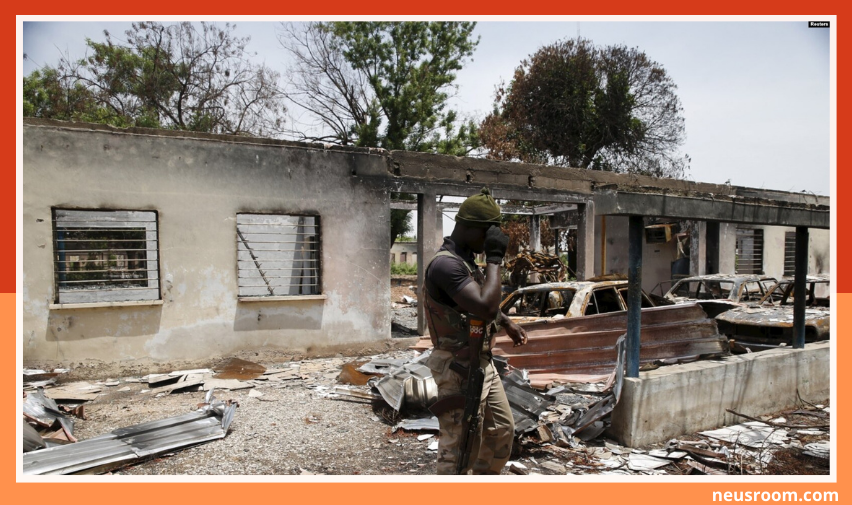
Ruins left by insurgents: A burnt building in Michika town after the Nigerian military recaptured the town from Boko Haram in 2015. Photo: Reuters.
With his father’s death and a year into his undergraduate programme at the Adamawa State University, Gideon was selected for a fully funded university scholarship sponsored by Senator Binta Masi Garba, who represented Adamawa North senatorial district between 2015 and 2019. Garba was also the only female Senator from the North in the eighth Senate.
After a degree in Computer Science from the Bestower International University, Cotonou in the Benin Republic and a year of teaching computer education at Obosi, Idemili LGA of Anambra state during the NYSC scheme, Gideon took on his biggest challenge yet – setting up an agribusiness at a time when Nigeria’s agricultural sector, which contributed 23% to the nation’s GDP in the first half of 2022, was suffering a large depletion due to insecurity.
In more than five years, insurgency, banditry and farmers-herders clash have taken a breathtakingly brutal toll on farmers across Nigeria. While many farmers have abandoned their farms to live in IDP camps, others have resorted to paying levies to bandits to continue farming. The outcome? A fall in agricultural production and food inflation.
In March 2022, the United Nations Food and Agriculture Organisation (FAO) said about 19.4m people across Nigeria will face food insecurity between June and August 2022. FAO identified insurgency as a leading cause of the crisis.
The Story of Kayaba Rice Farm
Gideon told me “after NYSC, I returned to Adamawa state to settle down and think about what to do. I have a passion for farming, so I decided I can’t sit and be waiting for a job. Then I reached out to someone who leased land to me to start farming.”
The seed funding for the business, Gideon said, came mostly from his savings during the NYSC.
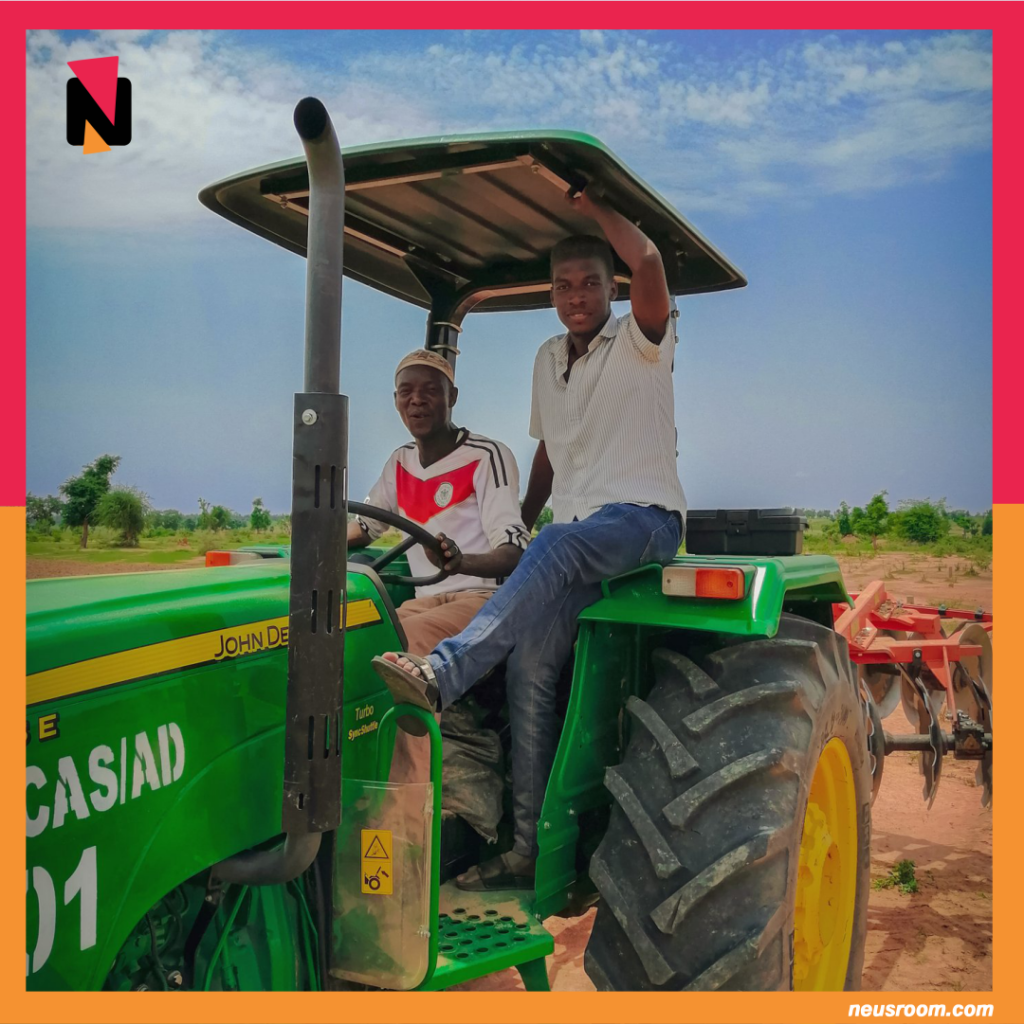
Gideon poses on the tractor he hired to cultivate the Kayaba Rice Farm. Photo: Gideon John.
“I was able to save the little we were being paid by NYSC,” he told me. “So automatically when the ₦33,000 allowance came in, I left it in the account, while I lived on the stipend the school was paying me and the school also provided an accommodation.”
He got a loan of ₦700,000 from a friend and added it to his ₦500,000 savings from NYSC.
He spent ₦1.3m to set up Kayaba Rice Farm. “The fund covered leasing three hectares of land at Zeken, ₦150,000 for three years, clearing the land, preparing the ridges, and buying fertilizer,” he said.
Farming is not for faint hearted. 🙆♂️
My heart is heavy, but who are we to question God? Strength and growth come only through continues effort and struggle.
📍@KayabaFarms pic.twitter.com/ULSkMQWaCF
— GDA 🌾🐂🚜 (@GidiDanAuta) September 26, 2022
Gideon’s Kayaba Rice Farm in Zeken, a border community between Lamurde and Numan LGAs of Adamawa state, is about five minutes drive from the bank of the Benue River.
A year before he started rice farming, in October 2019, the Nigerian government shut its land borders to prevent the smuggling of rice into the country and boost local production. Although many Nigerians faulted the decision which they claimed made food prices soar, some local rice farmers believe it helped to boost their businesses.
The first season, which came at the time of the border closure, was also great for Gideon’s rice farm. “We started in November 2020 and harvested 130 (70kg) bags of paddy rice in February 2021, which we sold at ₦16,000 each to a rice processing company in Gombe state,” he said.
Seeing how the first season yielded the desired result, Gideon said he paid back his loan and invested his returns to expand the business. As the business flourished, so did his dream. He leased four more hectares of land to extend the farm to seven hectares and considered adding rice processing and bagging to his business to make more profit instead of selling paddy rice to rice processing companies.
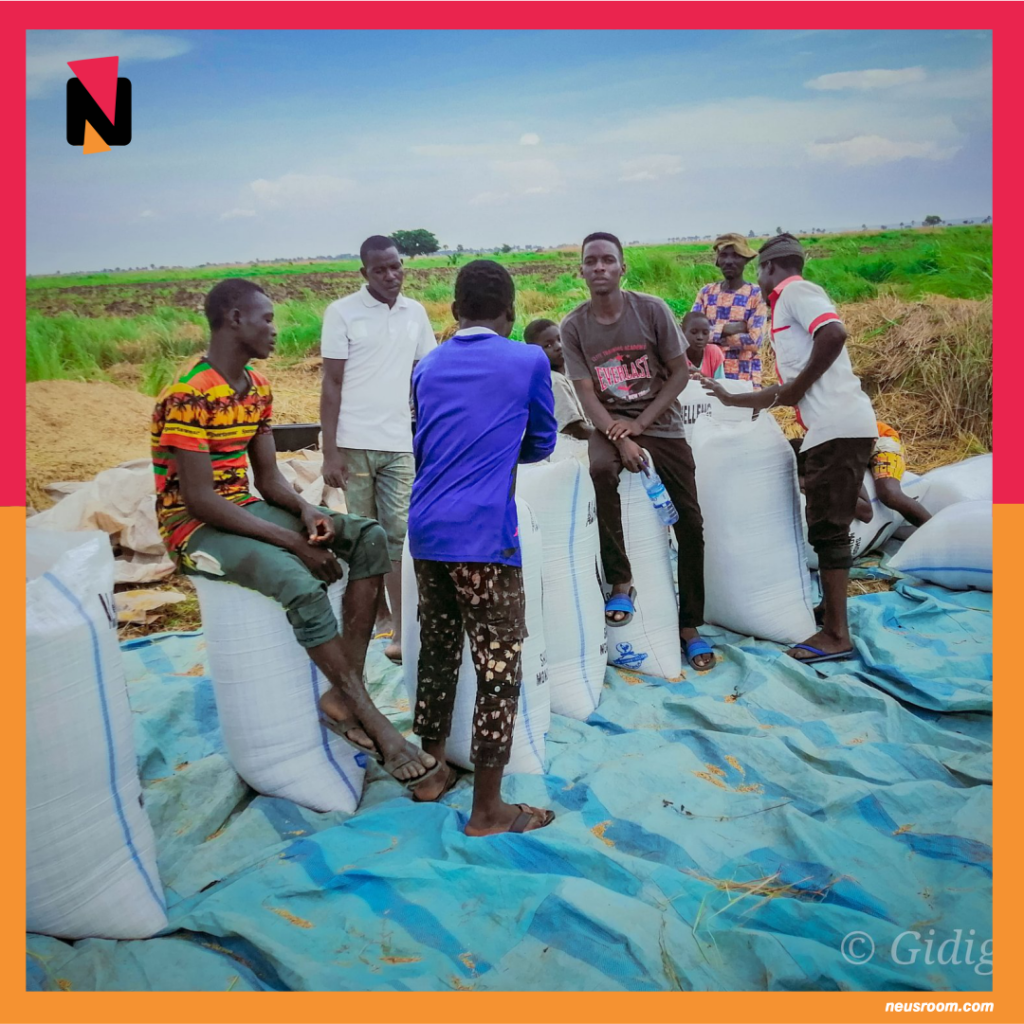
Gideon with workers at Kayaba Rice Farm after harvesting paddy rice before the flood. Photo: Gideon John.
“We wanted to start processing and bagging the rice,” he told me. “In all, I invested ₦1.6m to expand the business and we planted rice on the seven hectares in July to meet up with the 2022 rainy season.”
As it rained through July and August, Gideon was anticipating a bountiful harvest in October. As the rains intensified, which experts say was due to climate change, what he got in September overwhelmed him.
On September 22, he received a call from his farm manager that shattered his heart and left him in despair. His seven hectares of farmland were gone.
“My manager called and sent the videos to me,” he told me as his voice went from hush to sombre. “It was a big shock to me. Everything is gone. I don’t know where to start from.”
He puts the loss at ₦9m and said there’s no hope because “the flood submerged the farm above the plant level and the water has not receded”.
“It came as a big shock to me and has discouraged me completely because I had invested all I had into the business and two years later when I’m supposed to start enjoying the reward of my labour. Everything is gone!”
A decade of flooding
Since September 2022, Nigeria has been battling one of its worst floods, exactly a decade after the country recorded its worst flooding in recent history. Nigeria’s National Emergency Management Agency (NEMA) put the losses from the 2012 flooding at $16.9 billion, with over seven million people affected, 2.3 million people displaced, over 363 persons killed and about 597,476 houses destroyed or damaged.
Ten years later, Nigeria is witnessing another flooding disaster, and no one can ascertain the total casualties and cost of the losses yet. The destruction began to come into focus after NEMA announced in mid-September that the flooding had killed at least 300 people and displaced over 100,000.
“The devastation caused by these floods is saddening, most recently in Bayelsa, where the figures so far indicate 700,000 persons have been displaced in about 300 communities and villages. Our deepest condolences to the families of all the victims, and all those affected, nationwide,” Nigeria’s President Muhammadu Buhari, tweeted on Sunday, October 16, 2022.
As of October 20, 2022, the flood has displaced over 1.4 million people across Nigeria, affected over 2.5 million and killed over 600.
Every year, communities in Adamawa, Kogi, Nasarawa, Anambra, Cross River, Rivers, Bayelsa, Niger, Kebbi, Edo, Delta, Benue and Taraba, close to Nigeria’s main rivers – Rivers Benue and Niger experience the devastating impact of flooding much earlier than others as rainfall intensifies.
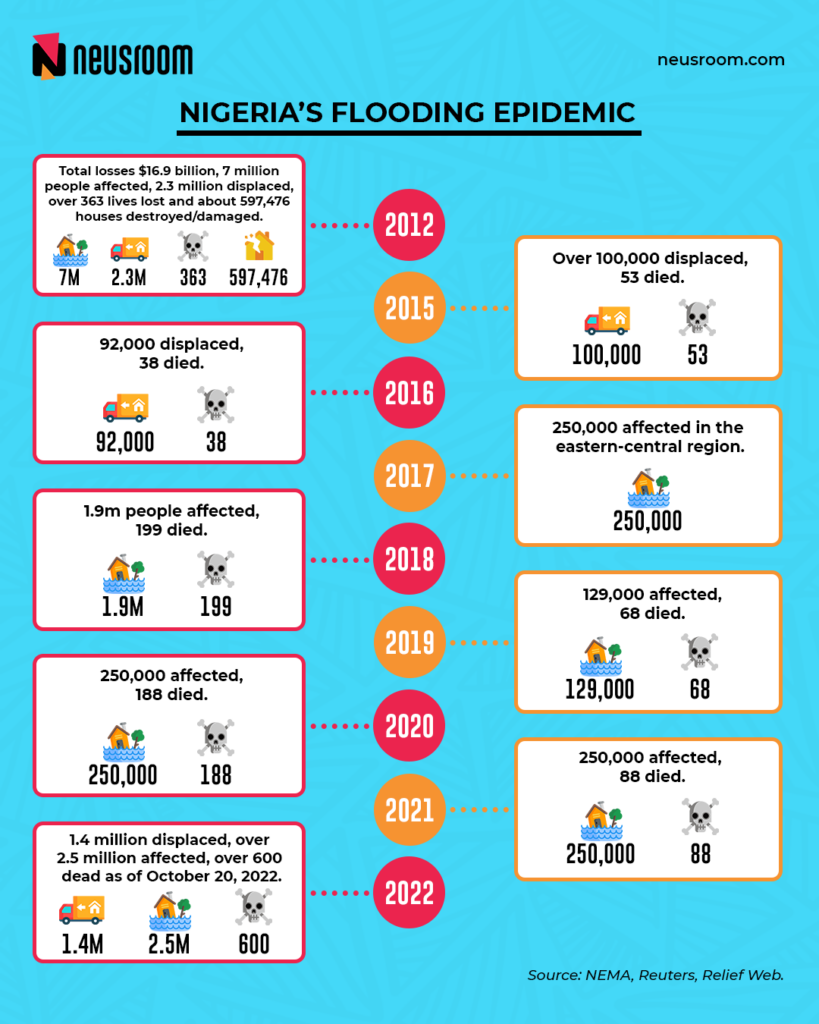
A chart showing Nigeria’s flooding epidemic in nine years. Designer: Tonte Briggs.
NEMA and the Nigeria Hydrological Services Agency said this year’s flooding is caused by the release of excess water from the Lagdo Dam in Cameroon.
Olumide Idowu, a climate change activist and co-founder of the International Climate Change Development Initiative (ICCDI Africa) believes Nigerians are not paying enough attention to the major source of the disaster – climate change.
“A lot of people say it’s the dam that was opened in Cameroon, but the truth about it is that if we don’t take urgent action, climate change will continue to increase the issue of flooding across Nigeria,” Idowu told me on Monday, October 17, 2022. “The climate is changing gradually, instead for us to take action, we are taking it for granted. Let’s take out Cameroon and ask ourselves how prepared are we for future occurrence.”
First, it was insurgency depleting agricultural products, now Nigeria’s floodwaters, a result of a fast-changing climate and lack of proper planning, is pushing farmers and residents deeper into misery that is expected to compound the food insecurity Nigeria is presently battling.
Idowu said climate change is real and it’s unfortunate that a lot of people don’t believe it.
Flooding and the Agony of a Nigerian Farmer
Abayomi Ogunniyi, a 30-year-old Nigerian farmer in Kwara State, Northcentral Nigeria, who lost his farm to the flooding, told Neusroom: “I had been confident that I was on track to solve the looming food problem for my pigs by investing ₦3 million in their food. Seeing everything submerged in water killed something inside me.”
Ogunniyi took to crop farming due to the rising cost of animal feeds which was taking a large part of resources from his piggery.
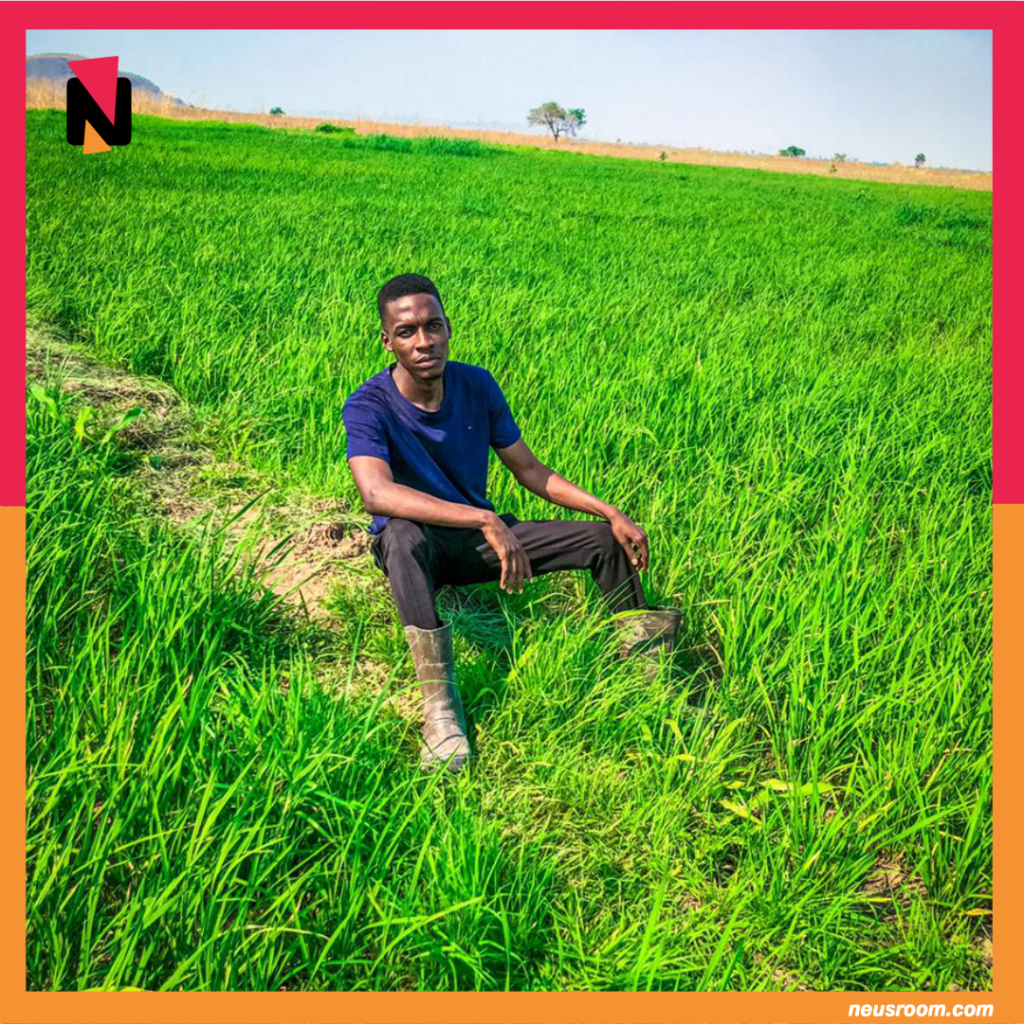
Gideon at Kayaba Rice Farm before the ruins. Photo: Gideon John.
Nigeria’s largest rice farmland of 4,400 hectares located in Rukubi Doma LGA of Nasarawa state and owned by OLAM Farm, has also been submerged by flood. Ade Adefeko, Vice President, Corporate and Government Relations at OLAM Nigeria, put the loss at $20m when he spoke to AriseTV.
“Government needs to invest in urban planning and data gathering. Data is very important to drive the solution we are looking at on this flood issue,” Idowu, the Climate Change Activist, said. “There must be a bilateral conversation between Nigeria and Cameroon on this issue of dam opening.”
Oche Edache, the General Manager of Addosser Insurance Brokers Limited in Lagos, told me there’s an insurance cover for flooding and agricultural produce in Nigeria.
“Farmers whose farmlands and crops were destroyed and even those who lost household items to the flooding, if they have an insurance cover, they would be compensated,” he told me on Monday, October 17, 2022.
Edache explained that “the way agricultural insurance cover works is that you will put your expectations side by side with the investment.”
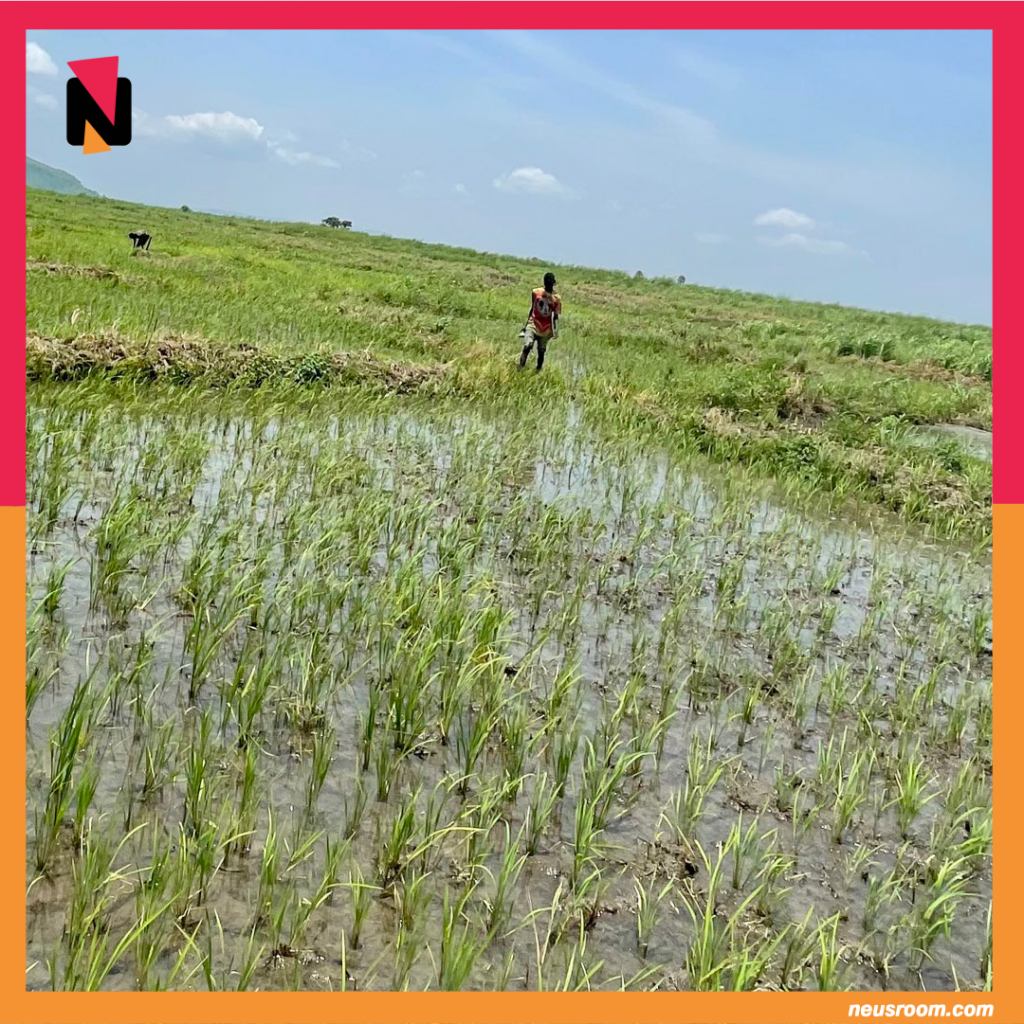
Kayaba Rice Farm in Zeken, a border community between Lamurde and Numan LGAs of Adamawa state, is about five minutes drive from the bank of the Benue River. Photo: Gideon John.
“For instance, a farmer invested ₦2m on a farm and was expecting ₦8m after harvest. If the farm is destroyed, the investment and the expected yield will be calculated, there’s an accrual formula that can be used to determine what the value of that farmland would be in weeks and months, and the farmer would be compensated,” Edache explained. “The type of cover the farmer chose will also determine the compensation. Some clients don’t extend their cover to their expected yield, they only cover their investment, which means in the case of destruction, the client will only be compensated for the investment and not the expected income.”
A Nigerian Farmer Starting Afresh After Flooding
When Gideon announced his loss on Twitter on September 24, 2022, a few internet users asked for his account details and in two days, he received ₦38,000.
With no other source of survival, Gideon has taken to graphics designing, “I’m also doing small IT jobs in Yola, Adamawa state,” he told me when he spoke with me from Yola that Wednesday night. I struggled for the first two minutes to hear him, the noise from the hustling and bustling in the Yola metropolis disrupted our conversation.
As Nigerians continue to count losses from the disaster, victims hope for government intervention which may never come.
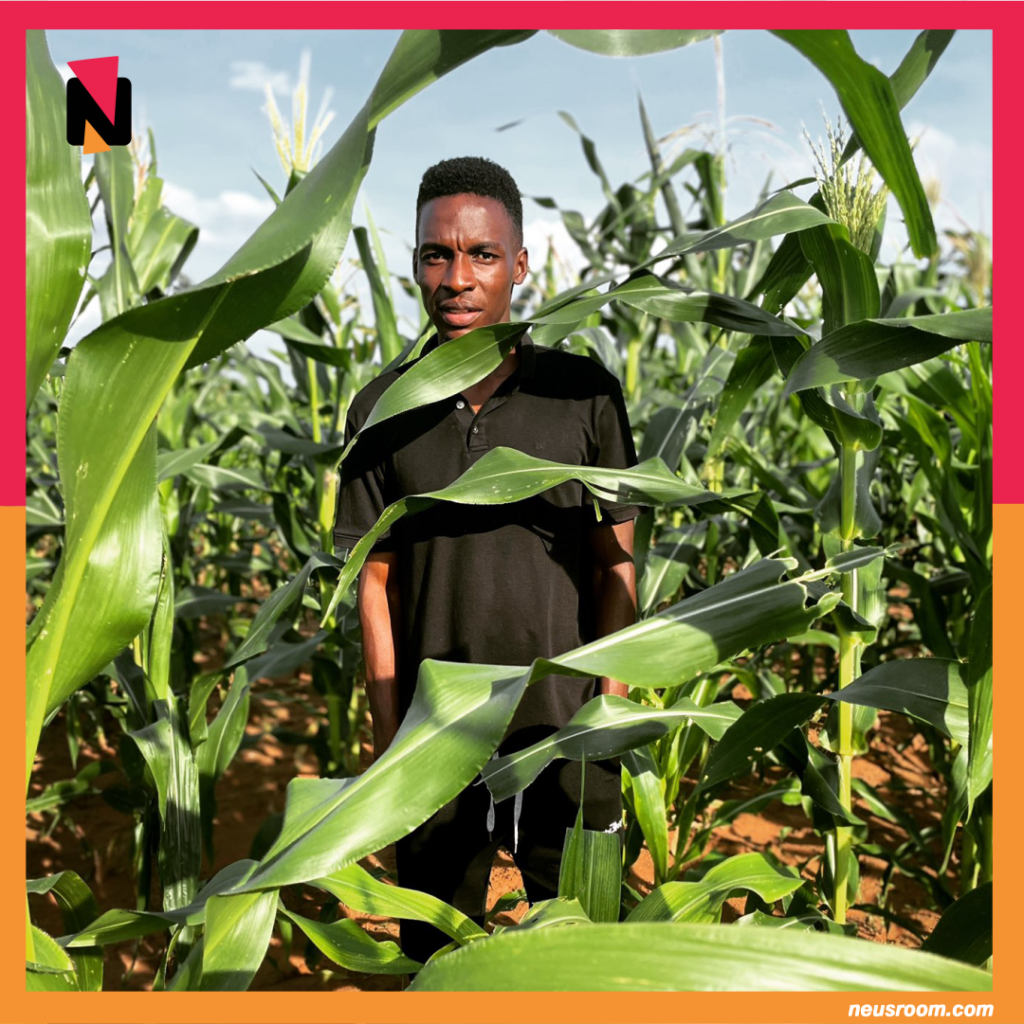
“One day I will tell you a story of pain, resilience, success, and victory,” a heartbroken Gideon tweeted. Photo: Gideon John.
“Nobody has given me anything,” Gideon said.
Although President Buhari announced on Sunday, October 16, 2022, that he has met with a delegation of Governors and they are working together “to alleviate the plight of all affected people and communities, until normalcy is restored,” if help never comes, the likes of Gideon, with a farm that engages more than 20 workers, may become another figure on the unemployment data.
Gideon, the last of his parent’s eight children, has nowhere to run to. He has chosen a life of self-survival. “I like to do my things on my own. I can’t be running to my siblings,” he told me when I asked about them.
Gideon John’s story is another staggering example of how avoidable disasters like flooding are choking the livelihood of many young Nigerians and a glimpse of how millions of young people are constantly searching for a way out of the nation’s unemployment, insecurity and climate change crisis.
Amidst all of these challenges that paint a disturbing picture suggesting that Nigerian society is designed to frustrate young people, some young Nigerians who have not considered the option of migration to Europe and America, are still pushing hard and devising innovative ways for survival as they remain optimistic about the future.
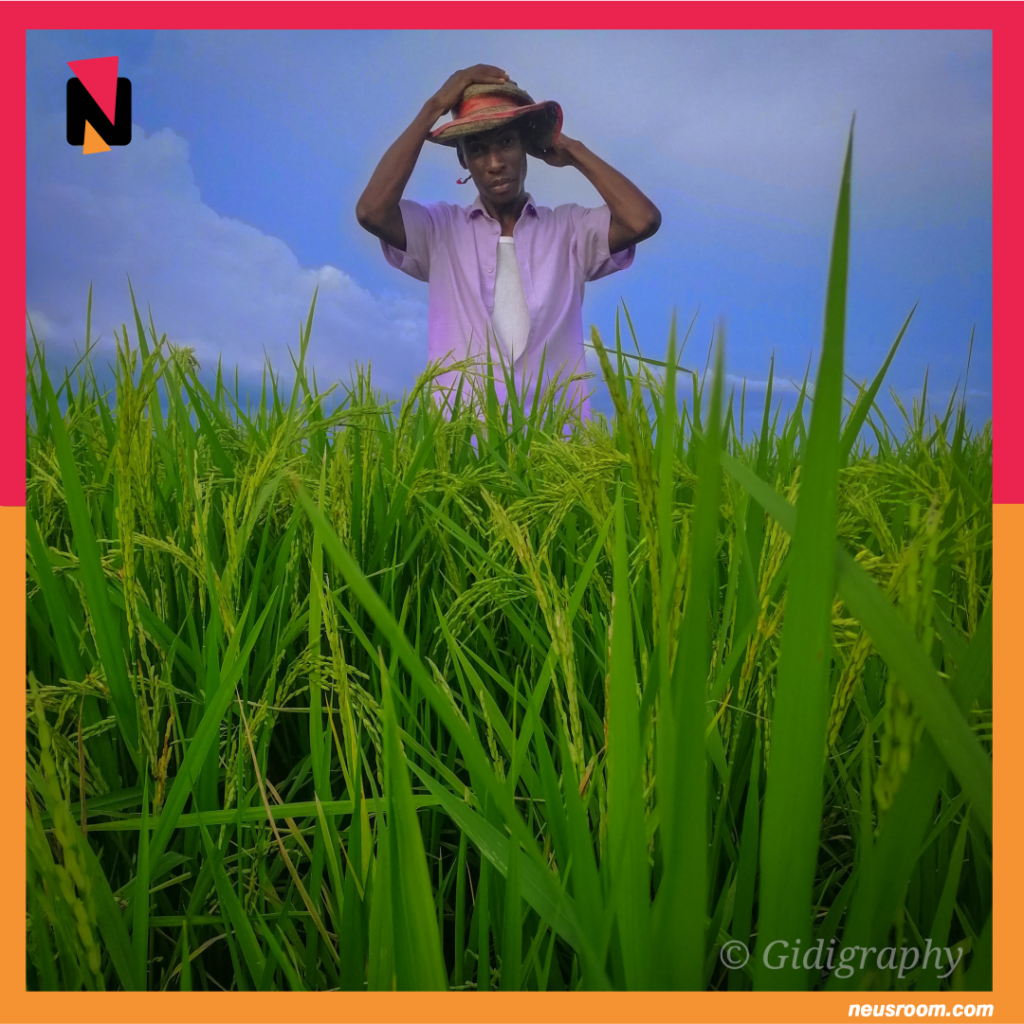
Gideon puts on his hat as he poses for a picture on his rice farm before the ruins. Photo: Gideon John.
Their hopes and aspirations are not over-bloated: they want well-paid jobs, to live and work in a safe environment, to have access to good healthcare and be assured of a society where their ideas can thrive without being choked by insecurity, economic woes, hostile government policies, and now climate change.
Many say it’s not too much to ask for and it is possible with the right hands on deck.
At 25, Gideon appeared to have everything already figured out for him and the shape his future will take. Then came the floods, and everything crashed in less than a week.
“One day I will tell you a story of pain, resilience, success, and victory,” he wrote in a recent tweet after the ruins.

